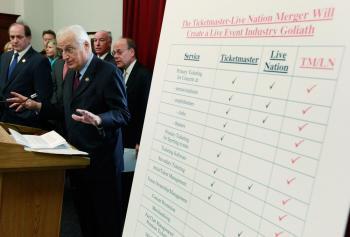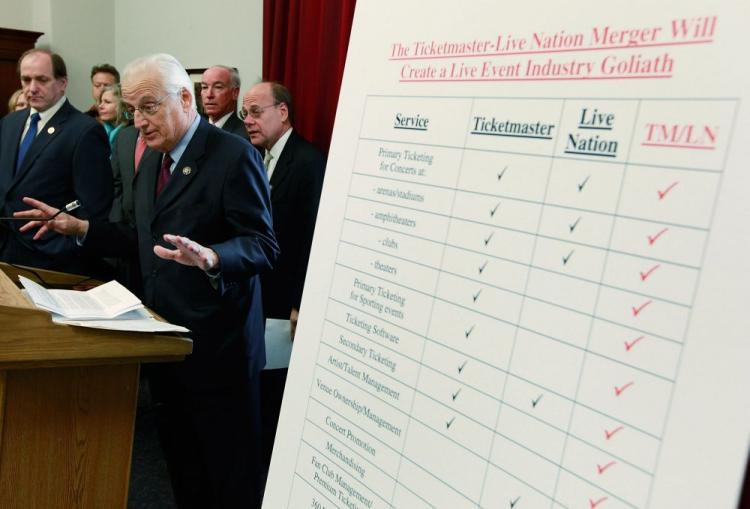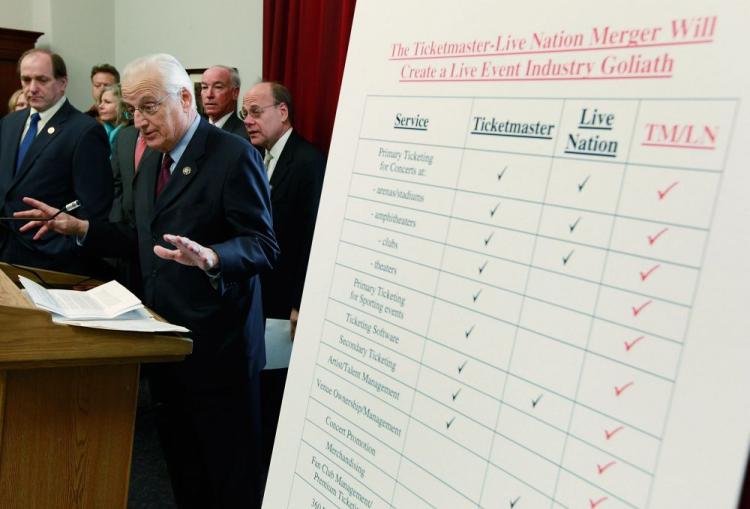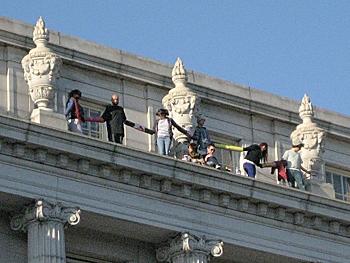The U.S. Department of Justice is ready to employ litigation to oppose the impending merger of leading ticketing giant Ticketmaster Entertainment Inc. and the nation’s largest concert promoter Live Nation Inc., according to Reuters.
According to a Jan. 8 release from Ticketmaster, 98 percent of shareholders favor the merger.
The merger will impact live entertainment consumers, artists, independent promoters, business managers, and will impact every state of the nation, according to a letter from U.S. Rep. Bill Pascrell Jr. (D-N.J.).
Ticketmaster is the live entertainment industry’s largest provider of talent management services and the second largest reseller of tickets.
The company currently holds a near-monopoly of selling 70 to 80 percent of all concert tickets, according to TicketDisaster.com, a Web site against the merger.
According to its Web site, Ticketmaster operates in 20 global markets and sold more than 141 million tickets valued at over $8.9 billion in 2008. According to TicketDisaster.com, Ticketmaster holds exclusive ticketing contracts with 139 venues, which includes “arenas, stadiums, professional sports franchises, and leagues, college sports teams, performing arts venues, museums, and theaters,” according to Ticketmaster.com.
Moreover, since it acquired Front Line Management Group in October 2008, Ticketmaster also has control over “the world’s leading artist management company,” which has contracts with over 200 artists, according to TicketDisaster.
Consumer and industry groups fear that this control of the live entertainment industry will grow with Ticketmaster’s merger with competitor Live Nation, which will likely introduce higher charges for access to venues, promotions, as well as ticket sales.
In July of 2009, 50 bipartisan members of the U.S. House of Representatives signed Congressman Pascrell’s letter to Assistant Attorney General for Antitrust Christine A. Varney of the U.S. Department of Justice. In the letter, Pascrell cites three reasons why the merger would have a negative impact.
First, the merger between two leading companies in the market for live entertainment ticket sales would reduce “horizontal competition.” The letter cites a May, 2009 ranking by TicketNews.com, which projected that if Ticketmaster merged with Live Nation, they would be over five times more powerful than their eight rivals combined.
Pascrell regards the merger, which shows that the two companies would rather combine than compete as “the essence of anticompetitive behavior.”
The second reason, Pascrell wrote, was that a merger would prevent either firm from expanding into new horizons. If the companies are merged, it’s unlikely for either one to enter into new industry markets which would induce healthy “market deconcentration and heightened rivalry.”
Moreover, a merger between Ticketmaster and Live Nation would create a vertically integrated company, in which five out of six industries concerned with the live entertainment industry, such as artist managers, promoters, and venue contractors, will be directly accessible under one centralized entity. This will make it difficult for competitors to enter the market, since they must also be vertically integrated in order to compete.
According to a Jan. 8 release from Ticketmaster, 98 percent of shareholders favor the merger.
The merger will impact live entertainment consumers, artists, independent promoters, business managers, and will impact every state of the nation, according to a letter from U.S. Rep. Bill Pascrell Jr. (D-N.J.).
Ticketmaster is the live entertainment industry’s largest provider of talent management services and the second largest reseller of tickets.
The company currently holds a near-monopoly of selling 70 to 80 percent of all concert tickets, according to TicketDisaster.com, a Web site against the merger.
According to its Web site, Ticketmaster operates in 20 global markets and sold more than 141 million tickets valued at over $8.9 billion in 2008. According to TicketDisaster.com, Ticketmaster holds exclusive ticketing contracts with 139 venues, which includes “arenas, stadiums, professional sports franchises, and leagues, college sports teams, performing arts venues, museums, and theaters,” according to Ticketmaster.com.
Moreover, since it acquired Front Line Management Group in October 2008, Ticketmaster also has control over “the world’s leading artist management company,” which has contracts with over 200 artists, according to TicketDisaster.
Consumer and industry groups fear that this control of the live entertainment industry will grow with Ticketmaster’s merger with competitor Live Nation, which will likely introduce higher charges for access to venues, promotions, as well as ticket sales.
In July of 2009, 50 bipartisan members of the U.S. House of Representatives signed Congressman Pascrell’s letter to Assistant Attorney General for Antitrust Christine A. Varney of the U.S. Department of Justice. In the letter, Pascrell cites three reasons why the merger would have a negative impact.
First, the merger between two leading companies in the market for live entertainment ticket sales would reduce “horizontal competition.” The letter cites a May, 2009 ranking by TicketNews.com, which projected that if Ticketmaster merged with Live Nation, they would be over five times more powerful than their eight rivals combined.
Pascrell regards the merger, which shows that the two companies would rather combine than compete as “the essence of anticompetitive behavior.”
The second reason, Pascrell wrote, was that a merger would prevent either firm from expanding into new horizons. If the companies are merged, it’s unlikely for either one to enter into new industry markets which would induce healthy “market deconcentration and heightened rivalry.”
Moreover, a merger between Ticketmaster and Live Nation would create a vertically integrated company, in which five out of six industries concerned with the live entertainment industry, such as artist managers, promoters, and venue contractors, will be directly accessible under one centralized entity. This will make it difficult for competitors to enter the market, since they must also be vertically integrated in order to compete.






